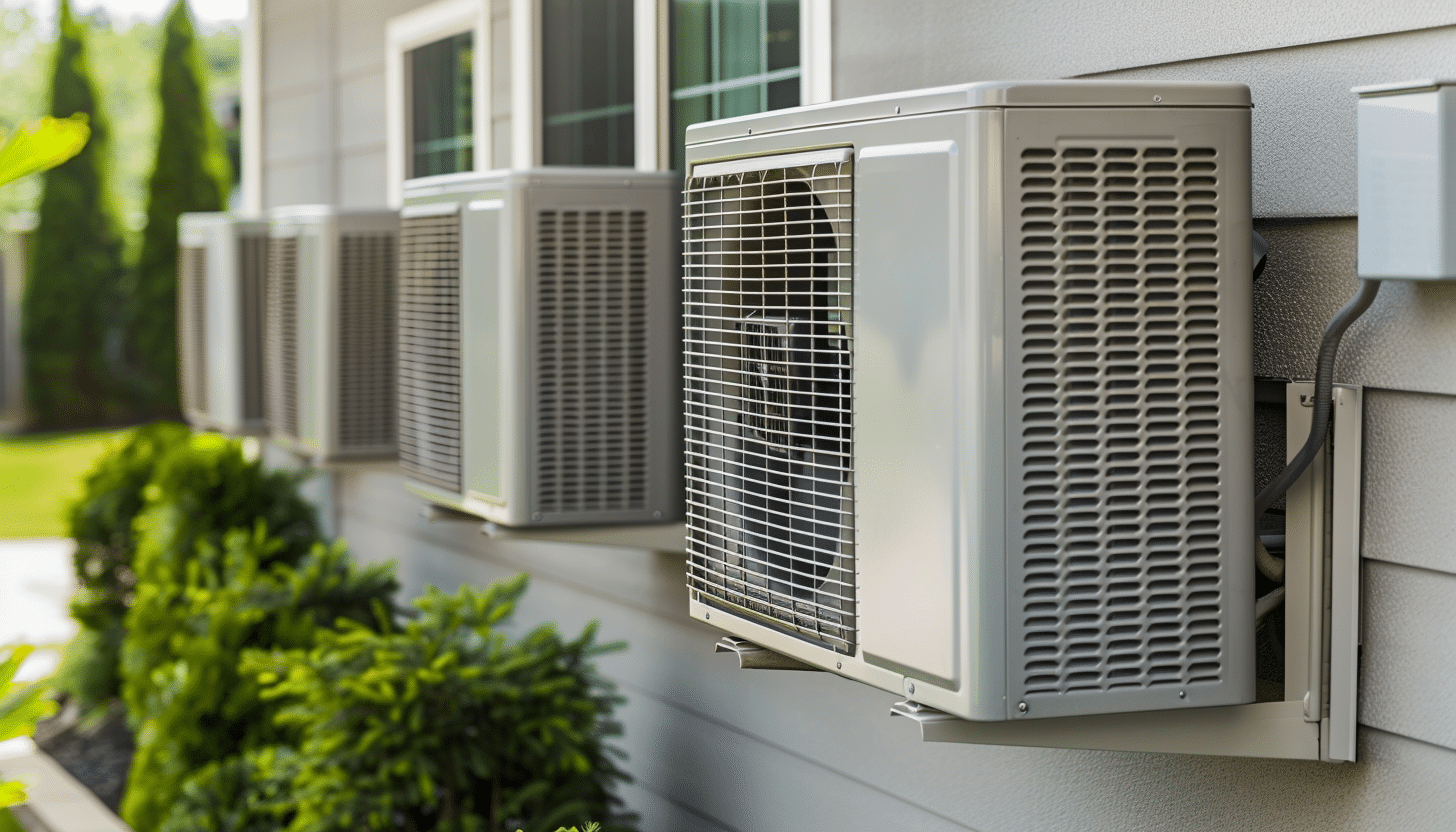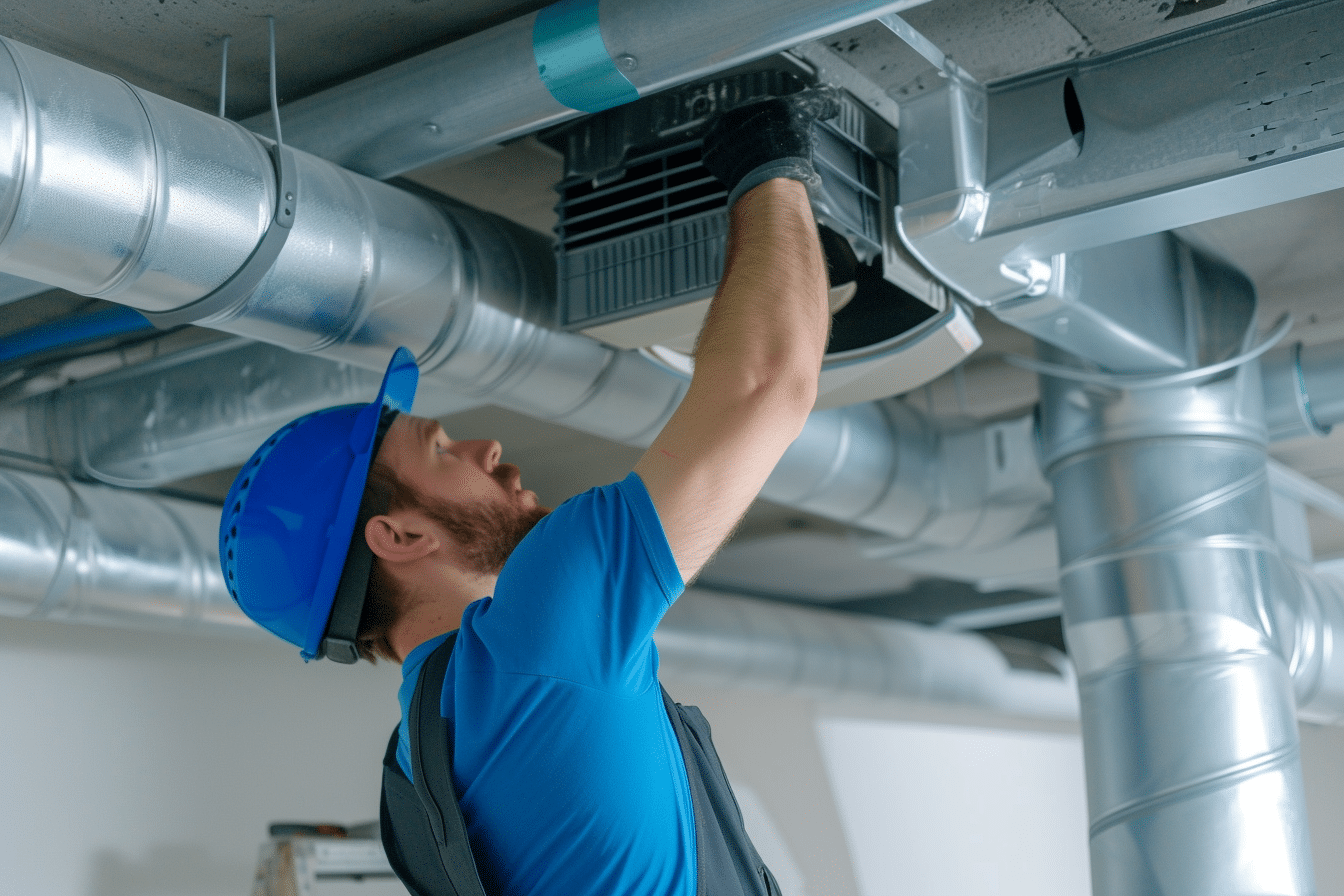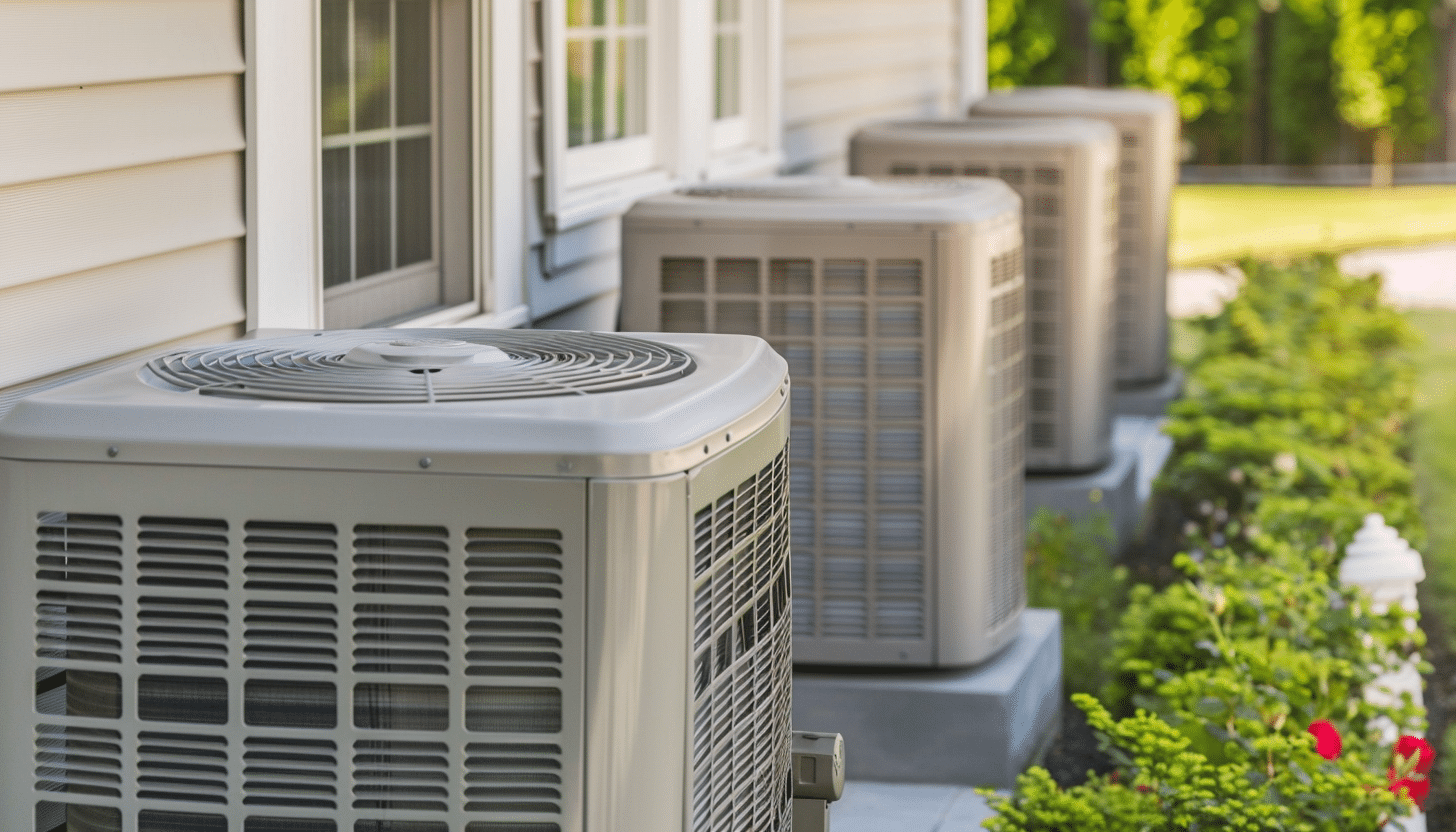Maximizing Home HVAC Lifespan – Tips and Practices
Wintri’s Maximizing Home HVAC Lifespan
Ensuring a prolonged lifespan for your home’s HVAC system in the United States is crucial for maintaining a comfortable living space. Smart home management involves regular maintenance, duct cleaning, using smart thermostats, improving insulation, and allowing system breaks to significantly extend the HVAC’s life. Not only does this keep your home comfortable, but it also prevents premature, expensive replacements. We’re here to share our best tips for enhancing your HVAC system’s longevity, helping you enjoy a cozy, energy-efficient home for years.
Key Takeaways
- A well-maintained HVAC system ensures prolonged efficient operation.
- Smart thermostats not only improve HVAC longevity but also offer economic benefits.
- Enhanced home insulation lessens the load on HVAC systems.
- Regular duct cleaning is vital for both indoor air quality and HVAC efficiency.
- Prompt repairs can prevent small HVAN issues from becoming significant, costly problems.
- Using the HVAC wisely and allowing it periodic rest can prolong its lifespan.

Importance of Maximizing Home HVAC Lifespan
Your home HVAC system plies tirelessly all year round to provide essential heating and cooling services. maximizing home HVAC lifespan and efficient function calls for a proactive maintenance approach designed to nip potential problems in the bud. One of the fundamental HVAC maintenance tips for extended lifespan is adherence to regular inspections, cleanings, and system tune-ups. Optimal times for these services vary depending on the part of the HVAC system in question. Spring is the ideal season for air conditioner servicing, while late summer or early fall is most suited for furnace servicing. This pattern ensures each component is in prime shape before its most demanding operating period. So, what do these maintenance activities involve? Here’s an outline:
- Inspection and lubrication of moving parts
- Cleaning of the condenser
- Checking refrigerant levels
- Changing filters
- Checking for heat exchanger cracks
Consistently performing these operations helps to minimize wear and tear on your system components. This, in turn, fosters efficient performance and helps in increasing the longevity of your home HVAC system.
| Maintenance Activity | Benefits |
|---|---|
| Inspection and lubrication of moving parts | Reduces friction and enhances smooth operation |
| Cleaning of the condenser | Promotes efficient heat exchange and cooler operation |
| Checking refrigerant levels | Ensures optimal cooling during summer |
| Changing filters | Supports clean airflow and reduces strain on the system |
| Checking for heat exchanger cracks | Prevents carbon monoxide leaks, maintaining safety |
As evident from the table, each maintenance activity plays a crucial role in preserving the health of your system. Adhering to a regular maintenance schedule is the key to enjoying a long-lasting, efficient HVAC system.
Implementing a Smart Thermostat for Efficiency
As we aim to find methods for maximizing home HVAC lifespan, the inclusion of smart devices such as the smart thermostat becomes vital. By accelerating the shift towards digitalized home management systems, we can largely enhance the efficiency and lifespan of HVAC systems.
How Smart Thermostats Can Reduce Wear and Tear
The central function of a smart thermostat is to make heating and cooling systems work more efficiently, thereby reducing the overall stress on the system. Featuring intuitive programming capabilities, these intelligent thermostats can automatically adjust the temperature settings based on your living habits. This autonomous adaptation aids in minimizing potential overuse and subsequent wear and tear on the system, a key element in maximizing home HVAC lifespan.
The Economic Edge: Saving Money with Smart Thermostat Use
Apart from augmenting system efficiency, smart thermostats offer a significant economic edge. If used smartly, these devices can yield considerable energy savings. Proof has been shown of homeowners saving an average of 10-12% on heating and upwards of 15% on cooling costs with the proper use of smart thermostats. This places these intelligent appliances not merely as a system improvement tool but also as a valuable contributor to domestic expense-saving.
| Advantages of using a Smart Thermostat | Potential Savings |
|---|---|
| Efficient Programming | Decreases unnecessary run-time |
| Automated Temperature Adjustments | Reduces system strain |
| Energy-saving mode | Cuts cooling costs by approximately 15% |
| Home habits and preferences learning | Saves on heating bills by approximately 10%-12% |
Enhancing Insulation to Ease the Load on Your HVAC
The less an HVAC system has to work, the longer it tends to last. With good insulation, your home can retain its indoor climate more effectively, reducing the frequency and intensity with which your HVAC system operates. This can vastly extend your home HVAC unit lifespan. Yet, surprisingly, many homes are under-insulated, leading their HVAC systems to overwork and wear out prematurely.
Identifying Insulation Weak Points
Usually, places like attics, basements, and exterior-facing walls are the key suspects when looking for insulation weak points. To begin with, you can do a simple touch test. Walls, floors, and ceilings that are well-insulated should feel warm and dry to the touch, while those that lack adequate insulation tend to feel damp and cold.
Best Practices for Upgrading Insulation
Once you have identified the potential problem areas, the next step is to upgrade the insulation in those areas. Improving insulation can notably improve a home’s energy efficiency and ease the load on your HVAC system.
You should consider hiring a professional to carry out an energy audit of your home. They will be able to make specific recommendations tailored to your home’s unique needs.
Moreover, there are many types of insulation to choose from for an upgrade. Fiberglass, cellulose, and foam are some of the most commonly used materials. The choice will likely depend on the specific needs of your home.
| Type of Insulation | Pros | Cons |
|---|---|---|
| Fiberglass | Non-flammable, non-absorbent | It can irritate the skin and lungs |
| Cellulose | Environmentally friendly, good sound insulation | Can settle over time |
| Foam | High insulation value, good for hard-to-insulate areas | It can be more expensive |
Remember, upgrading your home insulation is an investment that pays off over time, not only in maximizing home HVAC lifespan but also through reduced energy bills.
Maximizing Durability of Residential HVAC by Cleaning Ducts
In the pursuit of maximizing home HVAC lifespan, one essential measure is maintaining clean HVAC ducts. This often overlooked maintenance task is critical for both indoor air quality and the system’s efficiency.

Experts recommend performing a thorough duct cleaning approximately every five years to enhance the longevity and performance of an HVAC system. Such a service involves clearing out the air ducts, registers, and grilles, which can noticeably reduce the system’s operating strain and prevent potential malfunctions that could shorten the system’s life.
A comprehensive duct cleaning process delivers various benefits, as shown in the table below:
| Benefits of Clean HVAC Ducts | Description |
|---|---|
| Extended HVAC lifespan | Removes obstructions, reducing wear and tear on the system and enhancing system longevity |
| Better system performance | Alleviates unnecessary strain, allowing the system to function more efficiently |
| Improved air quality | Removal of collected dust, debris, and allergens leads to healthier indoor air. |
| Energy efficiency | By promoting optimal airflow, clean ducts can reduce energy consumption and save costs. |
In conclusion, regular cleaning of HVAC ducts is a non-negotiable part of HVAC maintenance. While it may seem like an extra expense initially, the benefits in terms of maximized durability of the residential HVAC system and the long-term performance enhancements make it a worthwhile investment. Remember, when it comes to maximizing home HVAC lifespan, preventive maintenance is always more cost-effective than reactive repairs.
Proactive Repairs: Addressing HVAC System Issues Promptly
To maximize the lifespan of your home HVAC system, regular maintenance and proactive repairs are key. While maintenance like cleaning and inspections helps, it doesn’t fully prevent wear and tear, especially in older systems. It’s crucial to quickly address issues, such as strange noises or leaks, to avoid more serious and expensive problems. Watch for signs like uneven home temperatures, rising energy bills, or odd noises and smells from the system. Promptly fixing these issues maintains efficiency and prevents further damage. A combination of consistent maintenance and timely repairs not only extends your HVAC system’s life but also enhances home comfort and benefits the environment by reducing energy waste.
Giving Your HVAC System a Necessary Respite
Maximizing the lifespan of your home HVAC system takes a bit more than regular maintenance and prompt repairs. One of the most effective strategies includes giving your system a necessary break and lessening the demands you put on it. This involves developing a thorough understanding of fan settings, energy consumption and employing natural ventilation methods. By adopting these measures, you can significantly cut down the stress your HVAC system experiences every day, aiding in the prolongation of its effective operation tenure.
Understanding Fan Settings and Energy Consumption
Understanding and adjusting your home’s HVAC fan settings is crucial for energy efficiency and extending the system’s life. Many homeowners don’t realize the impact of these settings on energy use and system longevity. HVACs typically have ‘auto’ and ‘on’ fan options. ‘On’ runs the fan continuously, leading to more uniform temperature distribution but increasing energy use and system strain. Conversely, ‘auto’ activates the fan only during heating or cooling, reducing energy use and system load, thus prolonging the unit’s lifespan.
Utilizing Natural Ventilation and Alternative Cooling Methods
Mother Nature provides us with several opportunities to naturally ventilate our homes, reducing the need to overload our HVAC systems. By simply opening windows, employing ceiling fans, or wearing season-appropriate clothing, we can drastically decrease our reliance on HVAC systems during moderate weather seasons like spring and autumn. This crucial respite can aid in extending the effective life of your system. Alternative cooling methods such as evaporative coolers or whole house fans can also be implemented in suitable regions, allowing your HVAC system to take an essential break and helping it last longer.
| Action | Benefit |
|---|---|
| Using the ‘Auto’ setting on your HVAC system | Reduces workload, optimizes energy consumption |
| Opening windows for natural ventilation | Decreases dependency on an HVAC system, particularly in moderate weather |
| Using Ceiling Fans | Enhances natural airflow, helping to maintain comfortable home temperatures without HVAC usage |
| Employing alternative cooling methods | Provides HVAC system with necessary rest periods, extending its lifespan |
Understanding the interplay between these factors and learning how to leverage them can keep your HVAC system running optimally for a significantly longer period, saving you substantial amounts in the long run, both in terms of energy costs and potential repair or replacement expenses.
Maximizing Home HVAC Lifespan
The longevity and effectiveness of your HVAC system depend heavily on proper installation. A professional, well-executed setup is key to preventing early damage and enhancing performance. The right installation goes beyond mere setup; it involves choosing the correct size and placement for your unit. An improperly sized HVAC system can cause higher energy consumption, inefficiency, and quicker deterioration. Conversely, a suitably sized system operates more efficiently and uses less energy, greatly extending your HVAC’s lifespan.
“The value of a professionally installed HVAC system far outweighs the costs. While it may seem like a hefty investment upfront, the cost savings in the long run, due to lower utility bills and fewer repair needs, are considerable.”
Professional HVAC Installation
Choosing an expert contractor for your HVAC installation guarantees a precise, tailored setup. They consider your home’s size, insulation, and window layout to suggest the best HVAC option. Their foresight helps avoid issues that shorten your system’s life. Remember, professional HVAC installation is a smart investment for a durable, efficient system. Take care in selecting a skilled contractor to protect your HVAC’s performance and lifespan.
Routinely Changing Air Filters for a Healthier Home Environment
We can’t stress enough the importance of regularly replacing your HVAC filters to maintain both a clean and healthy home environment and an efficient HVAC system. Homeowners are advised to inspect their filters every 30 to 90 days and replace them when they seem dirty. These filters, often made of disposable fiberglass or pleated material, play a crucial role in our HVAC systems. What role, you might ask? Well, other than promoting a healthy home environment by decreasing airborne contaminants, they also help maintain HVAC efficiency. When we neglect to replace these filters, we can inadvertently cause our HVAC system to overwork due to restricted airflow, thereby decreasing its lifespan.
The routine replacement of air filters is not just crucial for the health of your household but also for the health and longevity of your HVAC system.
- Inspect your HVAC filters every 30 to 90 days.
- If the filters appear dirty, replace them.
- Consider the types of filters your system uses: typically disposable fiberglass or pleated.
- Neglecting to replace your filters could lead to a decrease in HVAC efficiency as the system begins to overwork due to limited airflow.

To further illustrate the importance, let’s take a look at the following table:
| Type of Filter | Expected Lifespan | Benefits | Drawbacks |
|---|---|---|---|
| Disposable Fiberglass | 1 month | Inexpensive, easy to replace | Lower filtration ability |
| Pleated | 3 months | Good balance of cost and filtration efficiency | It may restrict airflow if not checked regularly |
Remember, maintaining a healthy home environment and HVAC efficiency should always be prioritized. By routinely changing air filters, we can ensure just that.
Reducing Strain with Proper Use of Home Appliances
In mitigating the weighty demands on home HVAC systems, understanding the proper use of other domestic appliances plays a pivotal role. Tools like ceiling fans and home automation systems can not only enhance the efficiency of HVAC units but also significantly reduce strain on these pivotal systems. Let’s explore some effective strategies for coordinated usage of these appliances.
Coordinating Ceiling Fans with HVAC Systems
When utilized in tandem with air conditioning systems, ceiling fans can significantly boost air circulation, allowing the HVAC system to operate in lower settings. This efficient synergy between ceiling fans and HVAC units leads to appreciable energy conservation, ultimately reducing HVAC system strain.
Leveraging Home Automation for Balanced Cooling and Heating
Modern home automation technologies are another vital tool for ensuring balanced home cooling and heating. By readily adjusting temperature settings relative to the occupancy, home automation systems effectively circumvent any unnecessary stress on HVAC units and ensure a more balanced and efficient ambient temperature.
| Appliance | Function | Benefit |
|---|---|---|
| Ceiling Fans | Boosts air circulation | Enables HVAC system to operate at lower settings, conserving energy |
| Home Automation Systems | Adjusts temperature settings based on occupancy | Prevents unnecessary stress on HVAC units, maintains balanced temperature |
Thus, strategic use of domestic appliances such as ceiling fans and home automation technologies significantly reduces the load on HVAC systems, contributing to their longevity while also ensuring efficient and balanced home cooling and heating.
Conclusion
Maximizing your home’s HVAC lifespan is crucial and involves proactive maintenance, smart technology use, and efficient strategies. It’s not just about avoiding expensive repairs; it’s about enhancing the system’s performance for long-term benefits. By strictly following these methods, homeowners ensure their HVAC systems work effectively and last for many years, providing consistent, comfortable, and energy-efficient climate control. A well-maintained HVAC system is a valuable asset to any home, making the effort in its upkeep worthwhile. Practices like using smart thermostats, improving insulation, making timely repairs, doing regular duct cleaning, and replacing air filters all contribute to extending your HVAC’s life. Treat your HVAC as a key home investment, requiring careful understanding, attention, and the use of technology for optimal performance. Taking charge of your HVAC’s care not only boosts its longevity and efficiency but also supports an eco-friendly, energy-conscious living space.
FAQ
What are some tips and practices for maximizing home HVAC lifespan?
Regular system maintenance is key to maximizing the lifespan of your HVAC system. This includes yearly inspections, cleaning, and tune-ups. Other actions, such as the installation of a smart thermostat, enhancing your home’s insulation, and cleaning your ducts, can also prolong your system’s lifespan.
Why is regular HVAC system maintenance important?
Regular HVAC system maintenance is crucial for the system’s extended lifespan. Routine maintenance activities can minimize wear and tear on system components, allowing for efficient and prolonged system operation.
How can a smart thermostat extend the life of my HVAC system?
A smart thermostat can adapt to your usage habits and schedule energy-saving changes autonomously. This reduces strain on the HVAC system and can help to extend its life.
How can enhancing my home’s insulation help my HVAC system?
Enhancing insulation reduces the workload on HVAC systems by retaining controlled temperatures. Poor insulation forces HVAC systems to work more, which can lead to increased strain and shortened system life.
How can I maximize the durability of my HVAC system by cleaning my ducts?
Clean ductwork helps sustain indoor air quality and the efficiency of the HVAC system. Having your ducts cleaned approximately every five years is recommended for increasing the performance and lifespan of your HVAC system.
How do proactive repairs address HVAC system issues?
Addressing any issues promptly is crucial in preserving the integrity and performance of an HVAC system. Quick and effective repairs can prevent minor issues from worsening into more serious problems that can lead to more costly repairs and even shorten system life.
How can giving my HVAC system a rest help with its lifespan?
The less your HVAC system has to run, the longer it will last. Using the “auto” setting on your system fan and utilizing natural ventilation can give your system the necessary rest and contribute to its longevity.
How can professional installation maximize my home HVAC lifespan?
Correct installation by a qualified contractor reduces the risk of premature damage and optimizes the operation of your HVAC system, both critical in maximizing the unit’s lifespan.
Why should I routinely change my air filters?
Regular replacement of HVAC filters is essential for maintaining system efficiency and a clean home environment. This prevents the system from overworking due to airflow restrictions, extending its lifespan.
How can proper use of home appliances reduce strain on my HVAC system?
Pairing the use of ceiling fans with air conditioners can enhance air circulation and allow the HVAC system to operate on lower settings. Leveraging smart home automation and other technologies can facilitate more balanced and efficient cooling and heating, further reducing stress on the system.

